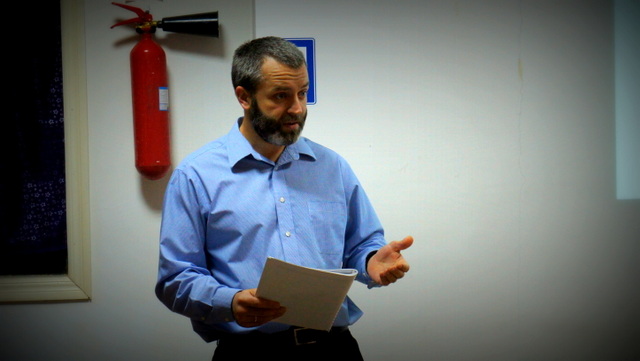There were times during my first year in Ukraine when I literally thought my brain was melting. I was working so hard a learning Russian that I started to forget English!
The first year of learning a new language can be discouraging if you don’t have a proper outlook. One thing I learned quickly is that comparing myself to others is never a good idea. Thankfully, I never had the chance to compare my language skills with my wife since Russian is her native tongue!
Five and a half years later I am glad to report that I have made progress. I preach and teach in Russian but it’s still difficult. Learning any language is really a life long task so I’m not discouraged when I run across a word or figure of speech that I don’t know. The important thing for me is to keep adding to my knowledge and working on my language skills.
I want to share with you a few tips I’ve picked up along the way. These are ideas and methods that have helped me and I hope will help you too.
Except for the first tip the list is not in any particular order.
Practice is king
By “practice” I mean finding situations where you regularly hear spoken language and have the opportunity for interaction. For me this happens at church, work, when we have guests over, in the store and with my neighbors. If you have more of an “out going” personality this may be easier for you but don’t lose heart if you don’t. That just means you need to work on finding those opportunities regularly and consistently.
Don’t compare yourself to others
You need to focus on your own progress. Some will learn faster, that’s just they way it is.
Have the courage to sound stupid
If you’re not used to saying stupid things and sounding like a three-year old then you’re probably not ready to learn a new language. The faster you can get over this hurdle the sooner you’ll be on your way to speaking with proficiency!
Focus on using what you already know
It can be discouraging you when you think about what you don’t know. You need to realize that there will always be unfamiliar words and figures of speech. I’m still learning new words in English. Focus on using what you do know and using it correctly. Add new concepts as they come.
Don’t use the excuse “I’m just not gifted in language”
If you speak any language then you have what it takes to learn another language. Too many people have given up because someone told them they are not “gifted” in language. Personally, I have never felt that I’m gifted in language and I still don’t feel that way. However, that doesn’t stop me from standing in front of 100 or more native Russian speakers every week and giving it my best!
Be a copy cat
First of all I do this in my head by constantly repeating phrases and pronunciations that I hear while listening to a native speaker. When you talk try to imitate a native speaker you know well. You might feel weird doing it but trust me, others will think it quite normal.
Always be in a learning mode
Read everything and always be alert. You may not think that your brain is taking it all in but your brain can amaze you. I have often used new words that I don’t even know where they came from. They just sounded right and so I used them. The brain has a way of filing everything and then bringing it up later when we need it. It helps when we are aware of this process.
Give yourself time
Don’t expect to be fluent in any language in 3 months. Some people may promise this but it’s not realistic. Yes, you may be able to hold a basic conversation after 3 months but if you want fluency you need to be in it for the long haul.
Don’t hit the books too hard at first
I’m not saying that you shouldn’t use books or study grammar I’m just saying that it works best once you gain a little experience in language. Learn like a child; listen and understand first, then work on speaking and finally work on reading and grammar.
Find a teacher who will only speak to you in the new language
Conversing with a native speaker who understands your language needs is vital. Especially in the first few months of study you need a teacher who will under no circumstances speak to you in your native language. This will force your brain to began making the new connections that it needs for this language!
Force yourself to talk with different people
You will be able to understand those with whom you speak most often. Try to broaden your circle so you can talk with people who might have a different accent or use different vocabulary.
Remember to engage in all aspects of the language
Listening, speaking, reading and writing are the main aspects of every language. Try to be engaged in every aspect.
Work on pronunciation as early on as possible
My wife, who speaks Russian as her first language, was a great help to me on this. I realize that not everyone has a spouse who is a native speaker. However, it can be helpful to find a native speaker who is willing to work with you specifically on pronunciation. You may even want to consider finding a professional speech therapist. The problem is that once you set your pronunciation it is very difficult to go back and correct it.













Jeff
January 30, 2013Thanks for this list, I’m forwarding it on.
Caleb
February 6, 2013You bet Jeff! I hope you find it useful!
Jim Moon Jr
January 30, 2013This list is so good. As a pastor with limited Spanish, but a vision to reach the nations living in our community, all of these are true and good advice – especially the ideas of copycat, pronunciation and learn like a child. TRUE! When we started our Spanish language work (with native speakers in the lead) I could barely communicate based on what I knew from classes in high school and university.
The thing I might add to the list is go to a language school in your target country/language. Especially one that emphasizes immersion. I’ve taken two two-week intensives over three years and I see progress each time. When you wake up in a country where you have to speak to eat or get around it is FAR more motivating!
I’d even add that state-side church planters should consider taking a year to go to language school like a missionary. It is not that much more expensive. Parts of the USA are mission fields where other languages are needed and/or super valuable to reaching immigrants and refugees.
Your moving to Ukraine and full-time immersion is the best way to learn, but some immersion for the rest of us is better than none.
Caleb
January 30, 2013Jim, spending time in your target language culture is really helpful. Of course, I live in Ukraine so that is pretty simple for me. However, I could just hide out at home and even though I’m in my target country I would not be in the culture. For sure we need to get out of our comfort zone and that’s usually when the real learning begins.
I appreciate your challenge to State side pastors too. Certainly there are many languages groups represented in the US.
Kevin Brubaker
January 30, 2013Thanks for the tips – I will soon be going through the same process and am already to some degree. In my case my wife also speaks Russian and we have a two year old. She only speaks Russian to our two year old, and this has been a great learning experience for me. I’ve also enjoyed our selection of Russian television stations – especially the news on Channel 1 Russia.
Caleb
January 30, 2013Kevin, you are pretty much in the same boat as I was about 5 years ago. You have a great advantage with your wife already speaking Russian. My advice would be to make sure that she is not your main Russian teacher. It’s best on the marriage relationship to let someone other than your wife correct you all the time! Blessings!
Loren Pinilis
January 30, 2013There’s a site online: “fluent in three months.” The author claims to have learned several languages in a very short period of time, even though he would have told you a few years ago that he’s not a language person. His basic method is immersion. Just go all out and NEVER speak any language but the one you’re trying to learn. Just like a lot of the great hints you have here.
Caleb
January 30, 2013I think it is possible to be conversant in 3 months. After my first 3 months in Ukraine I was able to have simple conversations. I suppose if someone was completely submersed, say they didn’t have a family and instead lived with a family who spoke the language, they would be able to do better than I did. However, I think it stretches the meaning of “fluent”. For most people, even with submersion, fluency is going to take at least a year or two.
I just asked my wife if she thought I was fluent yet in Russian (after five years) and she said, “Um, I think you’re pretty close” then she said, “Ya, you probably are.” Well, all I know for sure is that no matter how long you study a language you can always learn more.
Ethan Molsee
January 30, 2013Thanks for this list and post Caleb! I really needed to hear some of this today. We are in week 3 of language school here in France and it’s clear languages will not come easy for me. It is a bit fun to go out and realize that a sign I didn’t understand last week I now know the verb from… God bless.
Caleb
January 30, 2013Ethan, you’re in the stage right now when your brain can really melt down quickly. Anyway, don’t even think about being discouraged until you’ve been working on the language for at least 3 or 4 year! Take it one day, one word at a time. The important thing is to be constantly making progress!
Blessings to your family!
Dan Black
January 31, 2013Great tips, I have been thinking about learning Spanish(I live in San Diego CA) so it would be helpful. However, when I start thinking about it I get overwhelmed. Your points provided some practical and assuring ways to learn a second language.
Caleb
January 31, 2013Spanish is within your reach there in San Diego I’m sure. Actually there are a lot of languages spoken around your area. I would be important to find native speakers with who you can interact often.
Donovan
February 2, 2013Hi Caleb,
Excellent points here.
Thanks for getting in touch too. All the best with the great work you guys are doing in Ukraine!
Donovan 🙂
Caleb
February 2, 2013Thanks Donovan! I love your language blog, a ton of great resources there!
Sarah
February 11, 2013This is so helpful and very true. We’re 10 months into language-learning and I’m curious about exactly what you do to “work” on pronunciation. May I have a few examples? All I can really think of is going through lists of words and phrases with my helper, watching their mouth closely and using a mirror forcing my mouth into shape. What are some other creative and helpful ideas? Is it possible to work on pronunciation while alone, or is that dangerous to good pronunciation?
Caleb
February 11, 2013Sarah, I think that in order to really work on pronunciation you need a language helper who is aware of the difficulties in pronouncing different sounds for foreigners. Thankfully my language helper was really good at that right from the start.
At the beginning when I was concentrating on pronunciation my language teacher would just go over different combinations of sounds with me. She would say them and then I would repeat it and she would correct if needed.
You’ll want to make sure that your language teacher has good diction and grammar otherwise you’ll end up making the same mistakes, so choose wisely
All that being said if you are not aware of how you sound and if you are not constantly working on the subtle movements and positions that your mouth needs to form to say words then even the best language teacher will not be able to help you.
People tell me that in general I have pretty good pronunciation in Russian. However, often when I learn a new word I still need to work on correct pronunciation before I get it right.
One thing you could possibly try on your own is reading the Bible aloud while listening to an audio Bible in the language you are learning. The better you can imitate the voice inflection and tone and everything else the better your pronunciation will be.
Melanie Wilson
March 15, 2013Caleb, this is a great article. I will feature it in my homeschooling newsletter next week on Psychowith6.com.
Caleb
March 15, 2013Melanie, thanks for the encouragement! I just checked out your site http://psychowith6.com and I love it! What a great domain name too! We have 5 children and 4 of them are in homeschool right now so I guess that makes us psychowith5!
Btw, if your kid are interested in learning Russian here are a couple of video lessons that my oldest daughter Naomi did https://sukofamily.org/?tag=russian-lessons